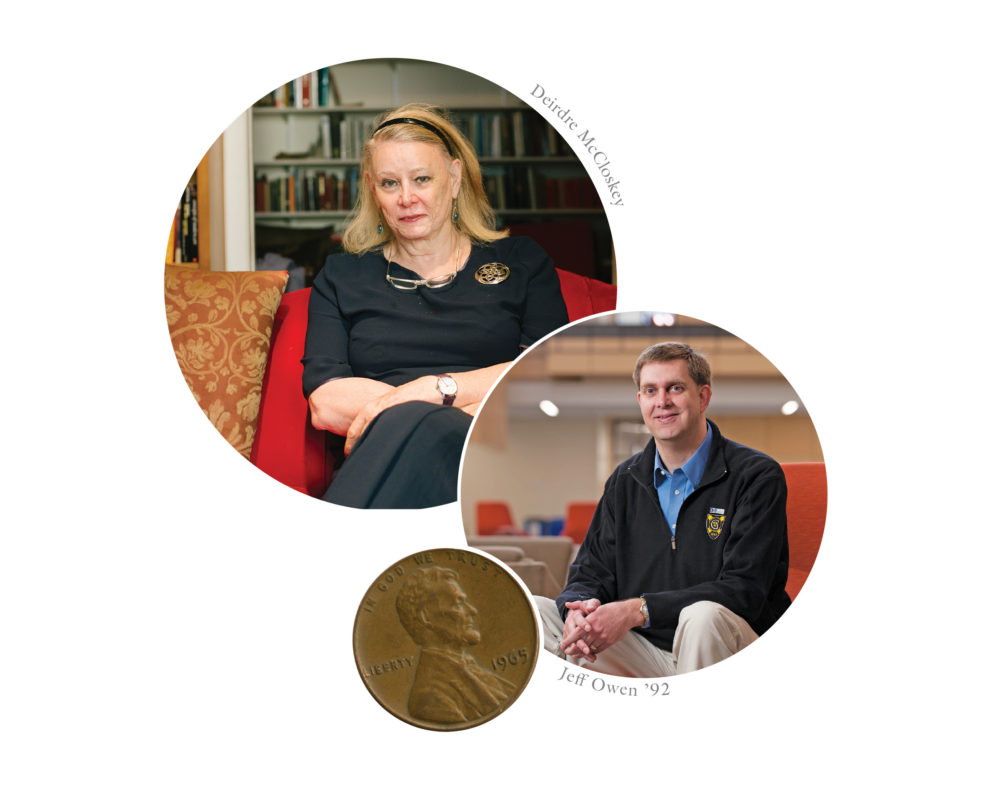
Renowned economist Deirdre McCloskey served as thesis advisor to Gustavus economics professor and graduate Jeff Owen ’92. McCloskey visits Gustavus for Nobel 52: The Search for Economic Balance.
TICKETS ARE ON SALE NOW for Nobel 52: In Search of Economic Balance.
“Do you want .325 hitters for the Twins to earn the same as .150 hitters? If you have a higher IQ than I have, should we pound nails into your head to bring us down to equality?” — Deirdre McCloskey
Gustavus: Let’s start with the million-dollar question. Does economics matter?
Professor McCloskey: Yes, alas. I would prefer to live in Eden, but as long as we don’t, we have to face up to scarcity, and that’s a big part of the lessons of economics.
Gustavus: What is the biggest problem in economics in today’s global economy? Income inequality?
McCloskey: Let me start by saying economic equality is a silly thing to want. Do you want .325 hitters for the Twins to earn the same at .150 hitters? If you have a higher IQ than I have (a good bet, by the way), should we pound nails into your head to bring us down to equality? We can’t—and largely shouldn’t—achieve equality. But we can—and should—achieve a decent income for everyone. The biggest economic problem today is not inequality, despite what you read in the newspaper. It’s the remnants of poverty. World poverty has fallen in the past 40 years—and the past 200—like a stone.
Gustavus: So the middle class has actually become better off?
McCloskey: Yes. Through improved quality of goods and services. Have you changed a tire recently? Tires used to last 4,000 miles at best. Have you had a hip-joint replacement? It was once crudely experimental. The consumer price index can’t adequately measure such improvements.
Jeffrey Owen: Of course this doesn’t mean there aren’t economic challenges. But it does seem like the ones we currently face (unemployment, stagnating wages, inequality, etc.) have been viewed as an indictment of our entire economic system. Professor McCloskey: Why do you think people are so quick to blame markets rather than recognizing how far they have taken us?
McCloskey: I think people are always disappointed by exchange. They gain, of course, but they resent that they didn’t benefit more. On the other hand, they can’t imagine professions without regulations or roads with private ownership. Basically I think it’s a matter of ideology.
Owen: There is anti-economy sentiment across the board. If you are pro-government, you expect regulation to fix everything, but the anti-government side also distrusts globalization, markets, and therefore true competition. We don’t recognize the success of modern economic growth, yet we can still see directly what happens where we don’t have it.
Gustavus: This sounds like a reason to study economics. What else can be gained by the study of it?
McCloskey: Well, being grown-up about economic realities, for one. Realizing, for example, that trading with your neighbors or with foreigners is good for all parties, or that raising the minimum wage by edict is not going to help the poorest workers, or that spending on a new sports stadium (as Professor Owen has shown) does not have “multiplier” effects.
Gustavus: Can we be prudent in economics in a way that is good for business and still be good people ?
McCloskey: You can be virtuous in business. Most people know this, but a lot of intellectuals don’t. I’m here to instruct them! The economy is composed of human beings. Human beings exhibit all the virtues (and matching vices of excess); prudence, yes, but also love, courage, justice, temperance, faith, hope. A literally loveless workplace portrayed in the Dilbert cartoon doesn’t work well, does it? We want an economy for humans, not for prudence-only sociopaths.
###
Media Contact: Director of Media Relations and Internal Communication Luc Hatlestad
luch@gustavus.edu
507-933-7510